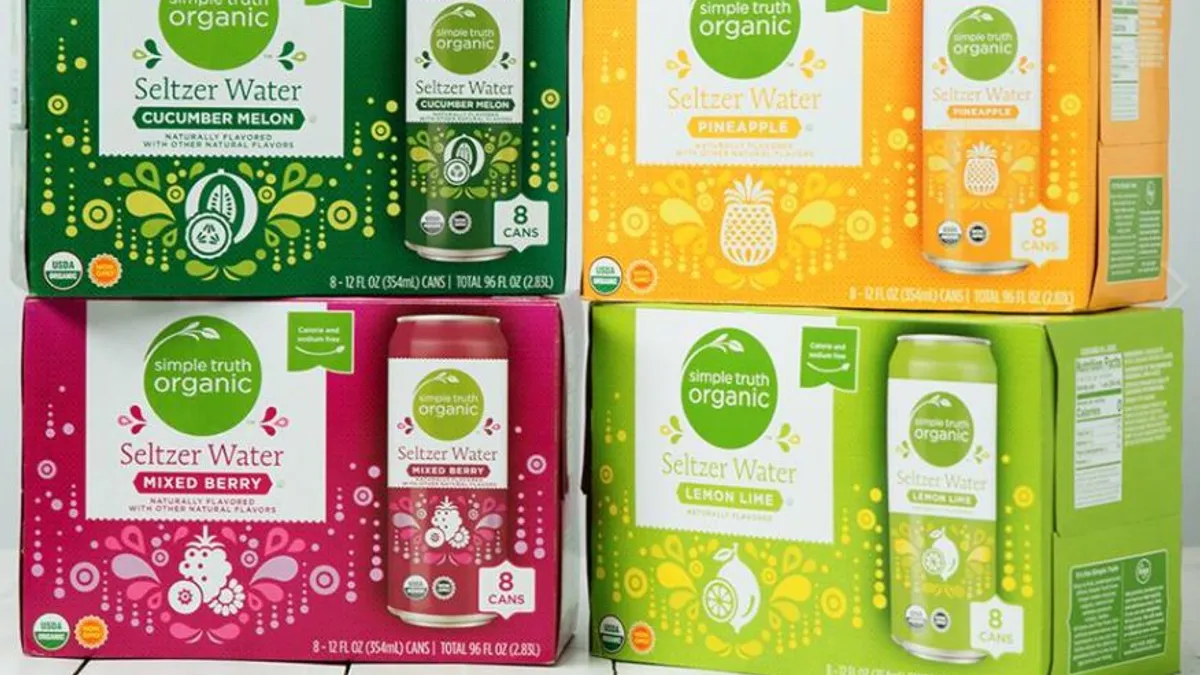Dive Brief:
-
Simple Truth, Kroger's line of more than 1,400 natural and organic products, has reached an annual sales milestone of $2 billion, the company announced. The line includes grocery, meat, produce, deli, bakery, baby, household essentials, personal care and Fair Trade Certified items.
-
The Simply Truth brand, launched in 2012, is sold in the Kroger family of 2,793 retail food stores under various banners in 35 states and the District of Columbia, and through ClickList or Vitacost.com for home delivery.
-
"Simple Truth is a brand that has earned our customers' trust through clean labels, fantastic flavors and affordability since its launch five years ago," Robert Clark, Kroger's senior vice president of merchandising, said in a statement. "Kroger is proud to have led the way in making this category more mainstream and accessible, feeding our customers' appetites for natural, organic and free-from products."
Dive Insight:
With a strong record of success, Kroger is pushing sales of its Simple Truth natural and organic products even more with a recently announced Our Brands promotion offering coupon savings on thousands of private-label items.
The Cincinnati-based retailer is seen as the role model for private labels. Sales of the Simple Truth line were up 19% in the most recent quarter, and Kroger plans to expand the brand — particularly beverages, snacks and plant-based protein items — during 2018. The company knows this is a can't-lose approach since store brands are making up as much as 17% of total grocery sales, according to The Wall Street Journal. Simple Truth has become the second-largest brand sold in its stores, the company said.
Recent data indicate U.S. consumers show no sign of lessening their demand for organic and natural products. More than one-quarter of all consumers (28%) said they felt better about themselves when buying organic foods. Organic sales in the U.S. totaled approximately $47 billion in 2016, up almost $3.7 billion from the previous year, according to the Organic Trade Association. Organic food accounted for 5.3% of total food sales in the country.
Kroger uses its 84.51 data analytics operation to strategize on marketing and promotions. At Kroger's investors conference last fall, Stewart Aitken, CEO of 84.51, said the firm sees 96% of every transaction, including what other stores customers shop at, what car they drive, whether they use an Android or iPhone and numerous other metrics. This kind of information helps the company develop ways to drive innovation and sales for popular products.
Kroger is not the only company to benefit from the rollout of a private-label brand. Albertsons also has enjoyed success with its O Organics brand, recently hitting the $1-billion sales mark and announcing plans to add at least 500 or more organic items this year. Safeway, now part of Albertsons, first launched the organic brand in 2005, when it was one of the first such labels in the country.
Continuing consumer demand for organic products is driving much of this growth, with millennials making up 52% of shoppers for organic items, according to research from the Organic Trade Association. That demographic has increasing earning power, and more millennials are becoming parents, a development which is also prompting more spending on organic food and personal care items, among other products.
Grocery chains would be wise to target these younger shoppers through mailers, social media and in-store displays — a move that would not only establish their loyalty but potentially their children as well. Retailers could also remind shoppers that private-label organic brands are an average of 18% cheaper, catering to the cost-conscious consumer.
Due to the success of many private-label brands, retailers continue to jockey for position in this crowded field. For Kroger, which already has an exclusive and large line of natural and organic brands helped by astute data analytics, it's poised to continue being a leader in this popular space.








